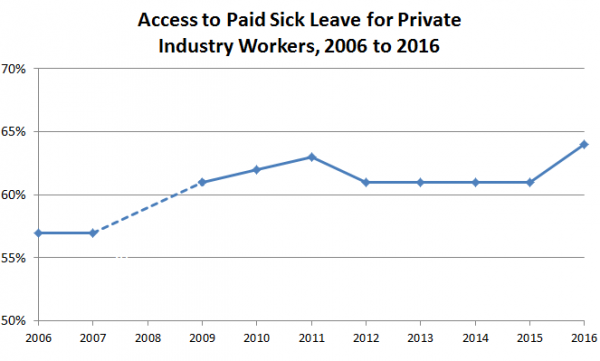
There is no national law ensuring that American workers can take a paid day off of work if they or their family members get sick. But there are now more than 30 of these laws in cities and states throughout the country.
On Wednesday, St. Paul became the second city in Minnesota to pass a paid sick leave law, following Minneapolis in May. Once it goes into effect, more than 68,000 workers in the city’s private sector who have gone without the benefit should be able to take a paid day for illness.

Starting next summer, those at companies with 24 or more employees would be able to earn up to 48 hours of leave a year, while those at smaller ones will be covered at the beginning of 2018.
Before this year, paid sick leave laws had mostly been concentrated on the East and West coasts. But the last three laws passed have been in the Midwest, with Chicago passing its own ordinance in June.
In total, with St. Paul’s passage, 28 cities and five states have passed paid sick leave laws.

These policies are already having a noticeable effect. The share of Americans who get paid sick days at work just reached an all-time high, climbing to 64 percent of the private sector workforce, up 7 percentage points over the last decade when cities and states began passing laws. Those toward the bottom of the income scale, who perversely are the least likely to get paid leave benefits, have been the biggest beneficiaries.

This increase also hasn’t come at the expense of employers or employment. A new survey of businesses in New York City found that the vast majority reported no increase in their costs to comply with the law, while most of the small share that saw them go up only had to grapple with an increase of less than 3 percent. Meanwhile, they reported virtually no abuse of the benefit by employees, such as taking days when they weren’t actually sick.
That comports with other surveys of employers after these policies have taken effect. Employers in Connecticut, Jersey City, and Washington, D.C. have also reported that the laws weren’t costly or difficult to comply with. The majority of businesses in San Francisco and Seattle actually support the policies now.
Job growth has also remained unaffected. It stayed strong in Connecticut and San Francisco even after paid sick days went into effect and was actually stronger in Seattle.
This article was originally posted at Thinkprogress.org on September 8, 2016. Reprinted with permission.
Bryce Covert is the Economic Policy Editor for ThinkProgress. Her writing has appeared in the New York Times, The New York Daily News, New York Magazine, Slate, The New Republic, and others. She has appeared on ABC, CBS, MSNBC, and other outlets.




